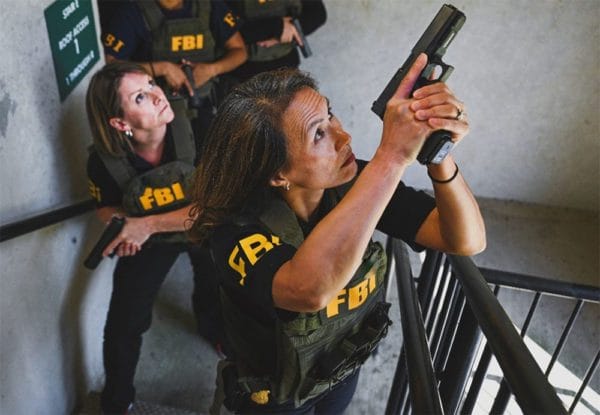
Can the FBI be held liable for a family’s trauma because a SWAT team smashed through the door of the wrong house in an October 2017 raid in Atlanta, detonating a flashbang grenade, handcuffing the man and holding him, a woman and her child at gunpoint?
The U.S. Supreme Court has agreed to hear the case, and the outcome could have a lasting effect on the way federal law enforcement and even local police conduct raids.
According to USA Today, the agent in charge of the raid blamed a GPS device for the mix-up. Apparently, nobody checked the actual warrant for the right address, but only relied on GPS, which has been known for sending motorists down dead-end roads.
Later in the day, as reported by The Hill, FBI Special Agent Lawrence Guera returned to the home, apologized for the erroneous raid and promised to pay for the damages, and even left a business card.
But when the victims of this wrong door raid sued for compensation under the Federal Tort Claims Act (FTCA) for the trauma they suffered, the 11th U.S. Circuit Court of Appeals turned them down flat. According to the USA Today report, the court said the FTCA “doesn’t apply if the disputed action by the law enforcement officer involved an element of judgment, even if the officer abused his discretion.”
The case brought by Trina Martin, her then-seven-year-old son Gabe (now in his teens), and her partner Toi Cliatt was detailed in a news release from the Institute For Justice (IJ) back in September. The Institute is described as “a nonprofit libertarian law firm that frequently brings cases to the high court.”
Here’s how that IJ release described what happened: Martin and Cliatt “were jolted awake by the sound of a flashbang grenade exploding in their living room. Toi, fearing that the home was being robbed, pulled Trina into the bedroom closet and reached for his legally owned shotgun. Just as he was about to grab it, an FBI agent barged in, threw him to the ground, and began interrogating him and Trina. All the while, Gabe was separated from his mother as officers stormed into his bedroom with guns drawn.”
“When Toi told the agents his address,” the narrative continued, “it dawned on them that they had raided the wrong house. The FBI had a warrant—for a house with a different address number on a different street.”
At least nobody was shot dead by the FBI team, which, by this point, may have exhaled a collective “Oops!” They withdrew and reportedly went to the right address, where an arrest was made.
The Institute for Justice is now involved, representing the couple. The case is known as Martin v. U.S.
“The FBI can’t undo the damage it caused by raiding the wrong house, but the government needs to pay for its mistake,” said Dylan Moore, an attorney at IJ. “Congress created the FTCA to give people like Trina, Gabe, and Toi a remedy. Courts should not do backflips to read that remedy out of existence.”
The Hill was conducting an unscientific survey of readers, asking whether they think the FBI should, or should not, have immunity in this case. Here are the latest results:
- Definitely should not: 70%
- Definitely should: 12%
- Possibly should: 4%
- Possibly should not: 10%
- Other / No opinion: 4%
According to The Hill, seven members of Congress on both sides of the aisle filed an amicus brief with the high court, urging the justices to take the case, and this may have helped Martin and Cliatt in their efforts. The bipartisan group consisted of Senators Rand Paul (R-Ky.), Ron Wyden (D-Ore.) and Cynthia Lummis (R-Wyo.) and Reps. Harriet Hageman (R-Wyo.), Nikema Williams (D-Ga.), Thomas Massie (R-Ky.) and Dan Bishop (R-N.C.).
The Hill quoted from the brief: “Today, victims of wrong-home raids by federal officers in Collinsville, Illinois, may sue under the FTCA, but victims of an identical raid in Collinsville, Georgia, could not…That asymmetry is untenable and contravenes Congress’s deliberate decision 50 years ago to accept responsibility and provide redress to those harmed by federal law-enforcement officers’ misdeeds. This Court should grant review to restore uniformity in this important area of federal law and ensure that Congress’s policy judgment is given effect.”
As noted in the petition for certiorari, “Whatever the finer details of why Agent Guerra led his SW AT team to the wrong house and kicked in the door without confirming the address, the dispositive facts are undisputed: The FBI raided the wrong house, traumatizing an innocent family who had done nothing wrong. No factual disputes cloud the questions presented or their application to this case.”
The Court will likely hear the case sometime in the Spring and deliver a ruling, likely in June.
About Dave Workman
Dave Workman is a senior editor at TheGunMag.com and Liberty Park Press, author of multiple books on the Right to Keep & Bear Arms, and formerly an NRA-certified firearms instructor.

from https://ift.tt/kcFRsdt
via IFTTT

No comments:
Post a Comment